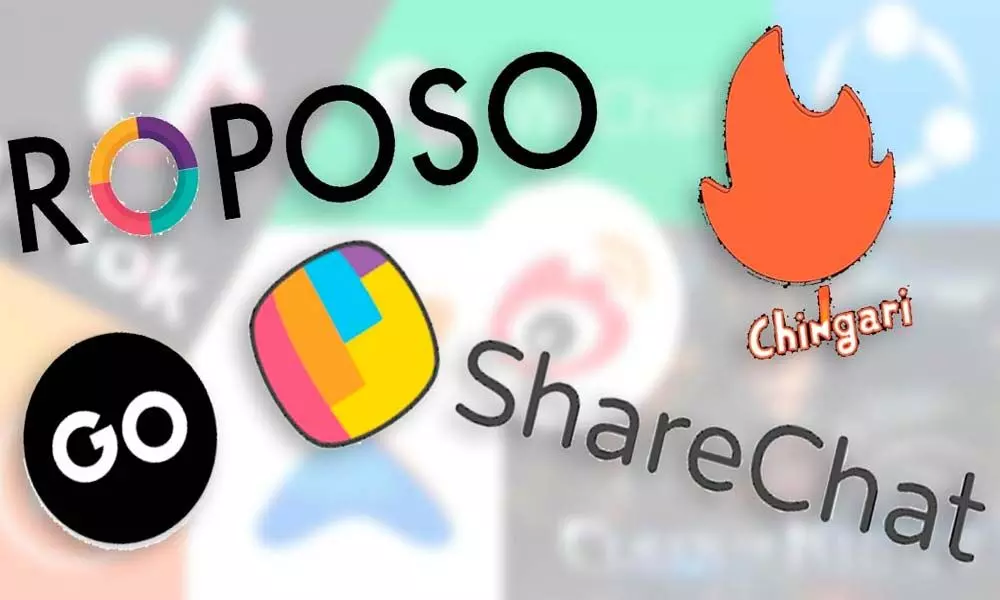More entertaining times ahead as home-grown apps' popularity surges
With the world's second largest internet user base and the highest data consumption, India is a big bet for domestic and international digital companies as a growth driver and money-spinner
image for illustrative purpose

New Delhi: Social platforms brimmed with user-generated content this year despite lockdown challenges and the growing popularity of homegrown short video platforms promises to make 2021 even more engaging and entertaining for netizens. With the world's second-largest internet user base and the highest data consumption, India is a big bet for domestic and international digital companies as a growth driver and money-spinner.
With the pandemic and the ensuing lockdown restricting movements, people turned to digital platforms for their dose of entertainment. They binged on web series on Netflix and Amazon Prime and logged onto platforms like YouTube to learn new recipes and pick up new skills like playing the guitar. Around mid-year, the Indian government banned 59 apps with Chinese links, including the hugely popular TikTok and UC Browser, saying they were prejudicial to sovereignty, integrity and security of the country. Another set of 118 apps were banned in September, while 43 more apps were added to this list in November.
Blocking of these apps came as a boon for homegrown startups like Moj, Chingari and Kaagaz Scanner that saw downloads and usage zoom almost overnight. This rapid pace of growth also helped many of them raise funds. VerSe Innovation received $100 million funding from Google, Microsoft and Falcon Edge's Alpha Wave Incubation, while vernacular language social networking platform ShareChat raised $ 40 million from Hero MotoCorp's Pawan Munjal, DCM Shriram promoters' family office, and others. Kaagaz Scanner secured $ 575,000, Bolo Indya mopped up $ 400,000, and Chingari raised $1.3 million in seed funding.
A big crowd puller was the fact that many of these creators are using local languages to connect with their audiences. According to a report by ShareChat, over 750 million user-generated pieces of content were uploaded onto its platform this year, with Hindi users accounting for 26 per cent contribution. The Twitter-backed platform, which has over 160 million users, saw over 700 million hours of video content being consumed on the platform during the year, with 30,000 hours of videos uploaded on ShareChat daily.
Bolo Indya, with its over 28 lakh-creator base, is focussed on helping them offer peer-to-peer commerce service, and thus monetise their skills.
After a Wall Street Journal report alleged that Facebook's content policies favoured the ruling party in India, questions were raised on the social media giant's alleged bias. The company has maintained that it remains committed to being an open, neutral and non-partisan platform. Facebook, which has faced criticism related to content on the platform and its handling in many countries, had set up an Oversight Board for content moderation in a transparent manner. Facebook -- which has 1.82 billion daily users globally -- had recently stated that out of every 10,000 content views in the third quarter, 10-11 were hate speech. Twitter drew flak over data breach when cyber attackers hacked into the accounts of high-profile users, including accounts of Jeff Bezos, Barack Obama, and Bill Gates, in a purported bitcoin scam.
Another gainer in 2020 has been the mobile gaming segment. While the ban of PUBG had many disappointed, it provided a fillip to other games like 'Garena Free Fire' and 'Call of Duty Mobile'. To cash in on the opportunity in the space, Bengaluru-based nCore Games had announced that it will launch FAU:G, a multi-player action game being developed under the mentorship of Bollywood actor Akshay Kumar.
According to Maple Capital Advisors Managing Director Pankaj Karna, the gaming industry in India grew at a CAGR (compound annual growth rate) of around 21 per cent during the lockdown with annualised growth estimated to be in the region of 30-40 per cent. "User base of some of the leading gaming companies have seen an increase of more than 100 per cent. The industry saw $355 million worth of private equity and venture capital investments from March-December 2020, with key deals being Dream 11 raising $225 million," he added. (PTI)
Stuti Roy

